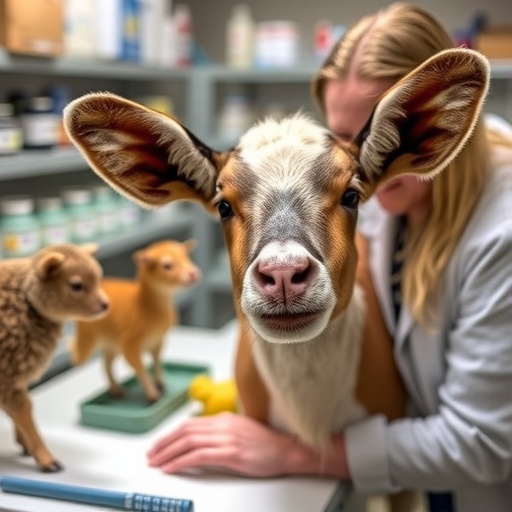In a significant development within the sphere of biomedical research ethics, Colorado State University (CSU) has terminated a contentious nutrition study that entailed the planned euthanasia of nearly 18,000 animals. This decision follows a formal appeal from the Physicians Committee for Responsible Medicine (PCRM), a nonprofit organization dedicated to elevating ethical standards and promoting human-relevant research methodologies. The discontinued investigation purported to explore the impacts of legume consumption on the human gut microbiome, a field of study gaining rapid momentum due to its implications for metabolic health and disease prevention.
The experimental design, initially supported by a U.S. Department of Agriculture (USDA) grant totaling $498,500, anticipated the sacrifice of 17,766 animals — primarily mice — to simulate dietary effects on gut microbial populations and systemic health markers. According to public records, the lead scientist on the project had utilized 1,587 mice prior to the study’s cessation. These figures underscore the extensive reliance on animal models that characterized the investigation despite alternative research paradigms.
Throughout the two months leading to the shutdown, PCRM actively engaged with CSU’s administration, voicing profound scientific and ethical objections. The organization addressed correspondence to Dr. Cassandra Moseley, the university’s vice president for research, and CSU President Amy Parsons, urging a comprehensive review of both the research’s necessity and the justification for animal use on such a massive scale. PCRM’s intervention highlights a growing movement within scientific communities advocating for the refinement or replacement of animal models with more human-relevant techniques.
Notably, Janine McCarthy, acting director of research policy at PCRM, highlighted in official communications that dietary studies focusing on pulse-rich diets and their influences on the gut microbiome can be conducted much more ethically and effectively through human clinical trials. Human volunteer studies, along with advanced in vitro systems and computational modeling, offer avenues to generate data with enhanced translational value than traditional animal experiments, which frequently fail to replicate human physiology and metabolism accurately.
Critical to the controversy was the evaluation process overseen by the Institutional Animal Care and Use Committee (IACUC) at CSU. Federal regulations and institutional policies mandate exhaustive searches for alternatives before authorizing animal use. However, PCRM’s review led to the conclusion that the primary investigator’s search was demonstrably inadequate. The failure to consider viable non-animal methodologies represents a breach of regulatory compliance and ethical responsibility. Moreover, the IACUC’s inadequate scrutiny allowed the flawed justifications to proceed unchecked, raising questions about governance and oversight mechanisms at the university.
In response to formal requests from PCRM for transparency, CSU confirmed via email on August 11, 2025, that the experiment had been officially halted on July 15, 2025. The university indicated no active protocols involving animal experiments remained under the primary investigator’s supervision. This confirmation marks a milestone in institutional willingness to acknowledge and act upon ethical concerns raised by advocacy groups and the broader research community.
The PCRM’s public gratitude towards CSU’s decision was accompanied by a broader call to action aimed at other academic and governmental entities. McCarthy emphasized that this move should serve as a precedent, encouraging a widespread shift away from animal-based research toward methodologies that offer greater relevance to human health outcomes. The advocacy further stresses the necessity for funding agencies like the USDA to cease support for animal experimentation in nutrition science, redirecting financial resources to innovative, human-centered scientific approaches.
The terminated study focused specifically on the interplay between dietary legumes—nutritional pulses such as beans, lentils, and peas—and the complex human gut microbiota, an ecosystem integral to immunity, digestion, and chronic disease pathogenesis. While the gut microbiome represents a frontier of biomedical investigation, PCRM’s stance argues that the translational validity of murine models in this area is fundamentally limited. Mice possess differing gut physiology, microbial composition, and metabolic responses, posing substantial barriers to drawing meaningful conclusions applicable to human health.
The case exemplifies a critical tension in contemporary biomedical research: balancing the perceived necessity of animal models against emerging ethical imperatives and evolving scientific methodologies. Technologies such as organ-on-a-chip systems, human microbiota-derived in vitro cultures, and sophisticated bioinformatics offer promising alternatives that mitigate animal suffering and improve experimental precision. The movement catalyzed by PCRM accentuates a paradigm shift toward these advanced methodologies, reflecting growing societal and academic demand for ethical accountability and scientific relevance.
In addition, the dialogue sparked by the nutrition study’s cancellation contributes to ongoing discourse around research funding priorities. The reliance on government grants for animal experimentation underscores the importance of funding bodies adopting rigorous ethical frameworks and criteria that favor humane science. Increased investment in human-specific research infrastructure not only aligns with contemporary ethical standards but also enhances the potential for breakthroughs in understanding diet-disease relationships in humans.
Ultimately, CSU’s decision stands as a testament to the power of ethical advocacy and transparent institutional governance. As nutrition science advances, integrating precision medicine with microbiome science, the imperative to adopt methodologies that reflect human biology accurately and ethically becomes paramount. This incident serves as a bellwether, highlighting the necessity for the scientific community to critically evaluate conventional research models and to reimagine how we investigate complex biological systems that underpin human health.
Subject of Research: Animals
Article Title: Colorado State University Halts Controversial Animal Nutrition Study Amid Ethical Scrutiny
News Publication Date: 2025
Web References:
– https://pcrm.widen.net/s/6kscgshbml/letter-to-dr.-moseley-csu-vp-of-research
– https://pcrm.widen.net/s/pphdbzqhlj/pcrm-letter-to-csu-president-07.16.2025
– https://pcrm.widen.net/s/zkdzzqdbh5/madeline-carey-email-08112025
Keywords: Research ethics, Diseases and disorders, Human health




